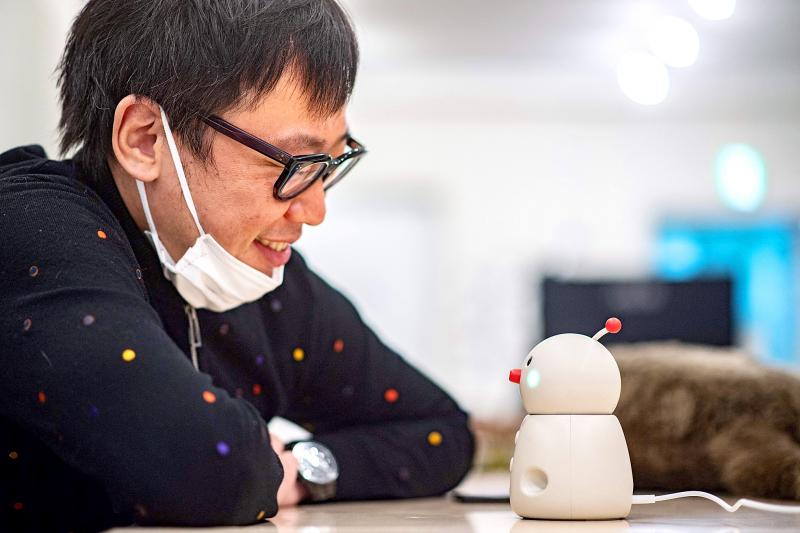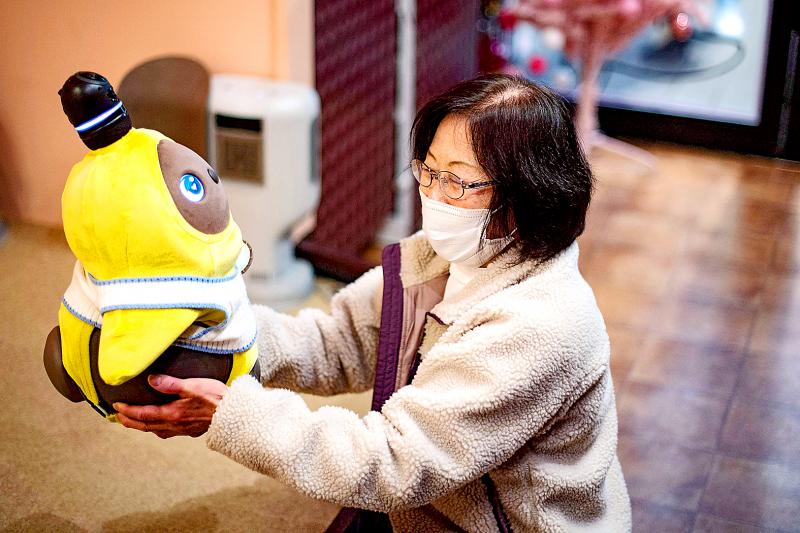Nami Hamaura said she feels less lonely working from home thanks to her singing companion Charlie, one of a new generation of cute and clever Japanese robots whose sales are booming in the COVID-19 pandemic.
Smart home assistants such as Amazon’s Alexa have found success worldwide, but tech firms in Japan are reporting huge demand for more humanlike alternatives, as people seek solace during COVID-19 isolation.
“I felt my circle became very small,” said 23-year-old Hamaura, a recent graduate who has worked almost entirely remotely since April last year.

Photo: AFP
With socializing limited, life in her first job at a Tokyo trading company was nothing like she had imagined.
So she adopted Charlie, a mug-sized robot with a round head, red nose and flashing bow tie, who converses with its owner in song.
Yamaha Corp, which makes Charlie, describes it as “more chatty than a pet, but less work than a lover.”

Photo: AFP
“He is there for me to chat with as someone other than family, or friends on social networks or a boss I needed to produce a report for,” Hamaura said.
She is a prelaunch test customer for Charlie, which Yamaha plans to release later this year.
“Charlie, tell me something interesting,” she asked while typing at her dining table.
“Well, well ... balloons burst when you spray lemon juice,” he said, cheerfully tilting his head to each side.
Sharp Corp said that sales of its small humanoid Robohon were up 30 percent in the three months to September last year from a year earlier.
“Not only families with children, but also seniors in their 60s and 70s” are snapping up Robohon, which talks, dances and is also a working phone, a Sharp spokesman said.
However, the adorable android — first released in 2016 and only available in Japan — does not come cheap, with regular models priced between US$820 and US$2,250.
Charlie and Robohon are part of a new wave of robot companions pioneered by firms such as Sony Corp with its robot dog Aibo, on sale since 1999, and SoftBank Group Corp’s friendly Pepper, which hit shelves in 2015.
“Many Japanese people accept the idea that every object has a soul,” said Shunsuke Aoki, chief executive officer of robot firm Yukai Engineering. “They want a robot to have a character, like a friend, family or a pet — not a mechanical function like a dishwasher.”
Yukai’s robots include Qoobo, a fluffy pillow with a mechanical tail that wiggles like a real pet.
The firm is soon to release its latest home assistant “Bocco emo,” which looks like a miniature snowman and allows families to leave and send voice messages through their phones.
Kaori Takahashi, 32, bought a Yukai robot-building kit for her six-year-old son to keep him occupied during the pandemic.
Robots feel normal in everyday life because they are in so many Japanese children’s films and cartoons, she said.
“I grew up watching anime shows The Astro Boy Essays and Doraemon, which both feature robots, and my children love them too,” she said.
Studies have shown that therapeutic robot pets designed in Japan, such as fluffy mechanical seals, can bring comfort to dementia patients.
Yet the makers of Lovot — a robot the size of a small toddler, with big round eyes and penguin-like wings that flutter up and down — think everyone can benefit from a bot that just wants to be loved.
It has more than 50 sensors and an internal heating system, making it warm to touch, which it reacts to with squeaks of joy.
Manufacturer Groove X said monthly sales shot up more than tenfold after COVID-19 hit Japan.
A single Lovot costs about US$2,800, plus fees for maintenance and software — but those without deep pockets can visit the “Lovot Cafe” near Tokyo instead.
One customer there, 64-year-old Yoshiko Nakagawa, called out to one of the robots fondly by name, as if to a grandson.
During Japan’s virus state of emergency, the capital became “stark and empty,” she said. “We need time to heal ourselves after this bleak period. If I had one of these babies at home, the heartwarming feeling would probably do the trick.”

PROTECTION: The investigation, which takes aim at exporters such as Canada, Germany and Brazil, came days after Trump unveiled tariff hikes on steel and aluminum products US President Donald Trump on Saturday ordered a probe into potential tariffs on lumber imports — a move threatening to stoke trade tensions — while also pushing for a domestic supply boost. Trump signed an executive order instructing US Secretary of Commerce Howard Lutnick to begin an investigation “to determine the effects on the national security of imports of timber, lumber and their derivative products.” The study might result in new tariffs being imposed, which would pile on top of existing levies. The investigation takes aim at exporters like Canada, Germany and Brazil, with White House officials earlier accusing these economies of

EARLY TALKS: Measures under consideration include convincing allies to match US curbs, further restricting exports of AI chips or GPUs, and blocking Chinese investments US President Donald Trump’s administration is sketching out tougher versions of US semiconductor curbs and pressuring key allies to escalate their restrictions on China’s chip industry, an early indication the new US president plans to expand efforts that began under former US president Joe Biden to limit Beijing’s technological prowess. Trump officials recently met with their Japanese and Dutch counterparts about restricting Tokyo Electron Ltd and ASML Holding NV engineers from maintaining semiconductor gear in China, people familiar with the matter said. The aim, which was also a priority for Biden, is to see key allies match China curbs the US

Teleperformance SE, the largest call-center operator in the world, is rolling out an artificial intelligence (AI) system that softens English-speaking Indian workers’ accents in real time in a move the company claims would make them more understandable. The technology, called accent translation, coupled with background noise cancelation, is being deployed in call centers in India, where workers provide customer support to some of Teleperformance’s international clients. The company provides outsourced customer support and content moderation to global companies including Apple Inc, ByteDance Ltd’s (字節跳動) TikTok and Samsung Electronics Co Ltd. “When you have an Indian agent on the line, sometimes it’s hard

‘SACRED MOUNTAIN’: The chipmaker can form joint ventures abroad, except in China, but like other firms, it needs government approval for large investments Taiwan Semiconductor Manufacturing Co (TSMC, 台積電) needs government permission for any overseas joint ventures (JVs), but there are no restrictions on making the most advanced chips overseas other than for China, Minister of Economic Affairs J.W. Kuo (郭智輝) said yesterday. US media have said that TSMC, the world’s largest contract chipmaker and a major supplier to companies such as Apple Inc and Nvidia Corp, has been in talks for a stake in Intel Corp. Neither company has confirmed the talks, but US President Donald Trump has accused Taiwan of taking away the US’ semiconductor business and said he wants the industry back